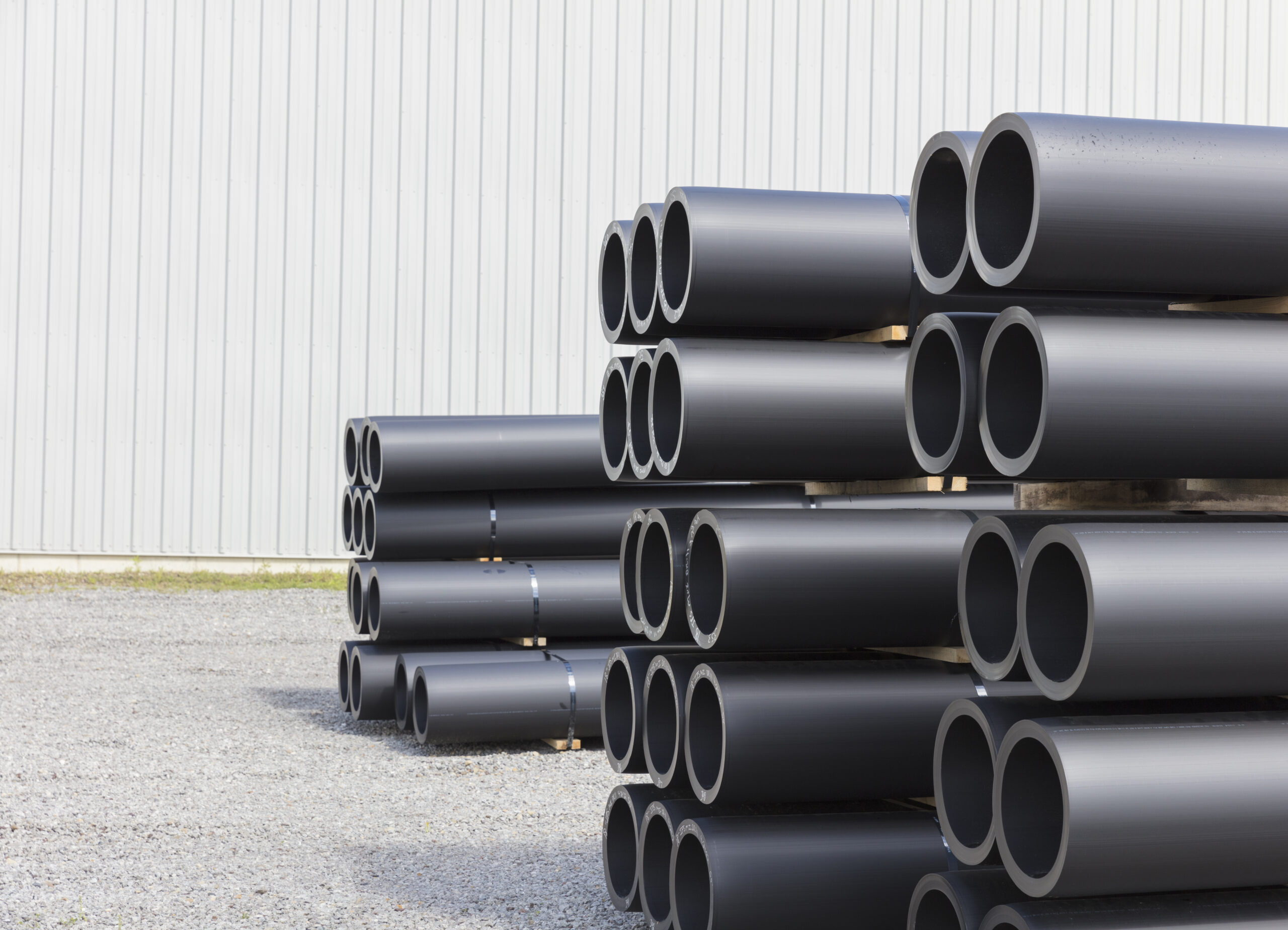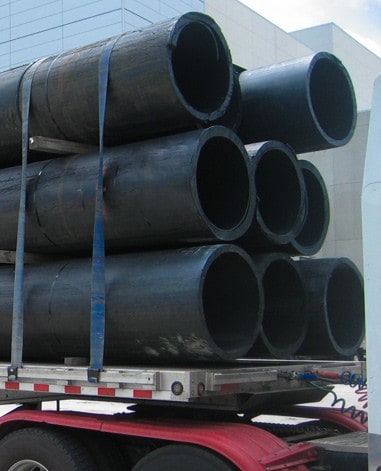Explore the Production Process Behind High-Quality HDPE Pipeline and Its Applications
The production procedure of high-grade HDPE pipes is detailed and methodical. It begins with the choice of raw products that boost performance. Following this, ethylene goes through polymerization to create resin, which is after that shaped with extrusion. Quality assurance is extremely important, making certain that the final item fulfills rigid requirements. Nonetheless, the journey of HDPE pipelines does not finish with manufacturing. Their applications across different markets reveal a broader value worth analyzing.
Recognizing HDPE: Residences and Advantages

High-density polyethylene (HDPE) is a flexible thermoplastic known for its sturdiness and resistance to different environmental aspects. This product displays superb tensile toughness, making it appropriate for demanding applications. Its low-density framework adds to a lightweight item, promoting ease of handling and installment. HDPE likewise showcases remarkable resistance to chemicals, which decreases deterioration when revealed to rough compounds.
The material's reduced wetness absorption even more enhances its longevity, making it ideal for use in pipelines and storage space containers. Furthermore, HDPE is resistant to ultraviolet (UV) radiation, making certain that products maintain their honesty also when revealed to sunshine. Its adaptability permits for the development of elaborate forms without compromising stamina. The environmentally friendly nature of HDPE, frequently originated from recycled materials, includes in its charm, promoting sustainable methods in production. In general, these homes and benefits make HDPE a preferred selection for numerous industrial and customer applications.
Basic Material Selection for HDPE Production
The option of raw materials for HDPE production is necessary to validate the last item fulfills the desired specifications and high quality requirements. High-density polyethylene (HDPE) is largely generated from polymerized ethylene, stemmed from fossil fuels such as natural gas or crude oil. The high quality of these feedstocks substantially influences the mechanical and thermal properties of the final HDPE.
Ingredients also play a considerable role in boosting HDPE's performance, consisting of antioxidants, UV stabilizers, and colorants, which boost sturdiness and resistance to environmental factors. The selection procedure need to think about not just the chemical structure of the raw products however also their processing qualities to ensure efficient manufacturing.
Moreover, the sourcing of resources need to focus on sustainability and compliance with environmental regulations, as accountable methods are crucial in today's market. Ultimately, careful raw material option lays the structure for creating high-grade HDPE pipelines ideal for diverse applications.
The Extrusion Process: Forming HDPE Pipe
The extrusion procedure plays an essential function in shaping HDPE pipes, starting with careful material prep work strategies that ensure excellent flow and uniformity. Equally crucial is the style of the die, which straight affects the final measurements and surface quality of the pipeline. Together, these factors add considerably to the effectiveness and high quality of HDPE pipeline manufacturing.
Product Preparation Techniques
Efficient production of HDPE pipelines starts with thorough material preparation strategies, especially the extrusion procedure. Throughout this stage, high-density polyethylene resin is very first dried out to eliminate dampness, guaranteeing excellent circulation attributes. The resin is after that fed into the extruder, where it undertakes heating and melting, transforming into a thick state. This home heating procedure is thoroughly regulated to keep the material's integrity and performance. The molten HDPE is required with a die, forming it right into a continual pipeline form. Appropriate temperature level management during extrusion is essential, as it straight affects the product's residential or commercial properties and the end product high quality. Once formed, the HDPE pipeline is cooled down and cut to specified lengths, ready for subsequent processing and applications.
Die Layout Value
Precision in die layout plays a necessary function in the extrusion process of HDPE pipes. The die acts as the last shaping tool, directly affecting the pipe's measurements, wall thickness, and surface coating. A well-designed die assurances uniform product circulation, lowering issues such as abnormalities and weak areas. The geometry of the die should be enhanced to accommodate the particular homes of HDPE, including its thickness and thermal actions throughout extrusion. Additionally, the cooling rate of the material as it passes via the die can markedly affect the pipeline's structural honesty. Subsequently, investing in advanced die modern technology is important for manufacturers aiming to produce top quality HDPE pipelines that satisfy industry requirements and customer assumptions.
Quality Control Actions in HDPE Manufacturing
Although different factors influence the top quality of HDPE pipe manufacturing, efficient quality assurance steps are essential to guarantee consistency and dependability in the end product. Trick quality assurance practices include extensive product examination, confirming that the raw polyethylene satisfies well-known requirements for purity and density. During the extrusion procedure, criteria such as temperature, pressure, and cooling time are very closely kept track of to his response maintain dimensional precision and structural integrity
On top of that, post-production screening is vital; suppliers usually perform hydrostatic examinations to analyze the pipeline's toughness and resistance to stress. Aesthetic examinations for surface issues even more boost quality control. Accreditation from relevant requirements companies, like ASTM or ISO, offers an additional layer of credibility. By implementing these comprehensive quality assurance actions, producers can decrease issues, enhance efficiency, and make sure that the HDPE pipes fulfill the particular requirements of numerous applications, eventually resulting in customer complete satisfaction and rely on the product.
Applications of HDPE Pipe Across Industries
HDPE pipes are made use of across numerous industries as a result of their longevity and adaptability. In water circulation systems, they guarantee reliable distribution, while in wastewater management, they give reputable solutions for waste transport. Furthermore, agricultural watering networks take advantage of HDPE's resistance to corrosion and adaptability, making it a suitable option for modern-day farming methods.

Water Circulation Solutions
A considerable number of markets depend on high-density polyethylene (HDPE) pipes for reliable water distribution systems. Known for their durability and resistance to corrosion, HDPE pipes are widely made use of in municipal water supply networks, agricultural watering, and industrial applications. Their light-weight nature assists in very easy handling and setup, lowering labor prices and time. In addition, HDPE pipelines can fit different pressure levels, making them appropriate for both reduced and high-pressure systems. Pipe Manufacturing Midland TX. The versatility of the product allows for seamless combination right into existing framework, reducing the requirement for considerable excavation. In addition, HDPE's resistance to chemical leaching assurances that the water provided continues to be risk-free and tidy, making it an ideal option for keeping the top quality of safe and clean water throughout different markets
Wastewater Management Solutions
Reliable water distribution systems likewise lead the way for innovative wastewater administration solutions, where high-density polyethylene (HDPE) pipelines play a significant function. Renowned for their toughness and resistance to corrosion, HDPE pipelines are ideal for carrying wastewater in different setups. Their here are the findings flexibility enables very easy installation in complicated settings, minimizing the requirement for considerable excavation. Additionally, HDPE's smooth interior surface area lowers friction, enhancing flow prices and efficiency. These pipes are likewise immune to chemical leaching, ensuring that pollutants do not endanger the surrounding atmosphere. Industries, communities, and treatment centers increasingly count on HDPE pipes for their integrity and long life, making them a recommended choice for modern wastewater management systems. This adaptability underscores the crucial value of HDPE pipes across numerous applications.
Agricultural Watering Networks
Agricultural watering networks profit substantially from making use of high-density polyethylene (HDPE) pipelines, which give efficient and reliable water delivery to plants. HDPE pipelines are lightweight, making them simple to carry and set up, while their flexibility enables numerous arrangements in diverse terrains. These pipelines show exceptional resistance to rust, chemicals, and UV radiation, making sure toughness in extreme farming atmospheres. In addition, their smooth indoor surface area reduces friction loss, maximizing water circulation and minimizing energy prices related to pumping. The durability of HDPE pipelines, typically surpassing 50 years, adds to reduce upkeep and substitute expenses. Farmers increasingly count on HDPE pipes to improve irrigation performance and promote lasting farming practices, inevitably leading to improved plant returns and resource conservation.

Future Patterns in HDPE Pipe Modern Technology
As the demand for sustainable and effective infrastructure expands, improvements in HDPE pipe technology are positioned to transform different sectors. Emerging trends include the combination of wise technologies, such as sensors and IoT capabilities, which promote real-time monitoring of pipe problems, lowering upkeep expenses and avoiding leakages. Additionally, the advancement of innovative manufacturing methods, such as 3D printing, is making it possible for the production of complicated, tailored pipe styles that satisfy particular task needs.
Moreover, the focus on recycling and round economy techniques is driving the development of HDPE pipelines made from recycled materials, boosting sustainability. Improved jointing approaches, such as electro-fusion and mechanical installations, are likewise boosting installment performance and reliability. The growing emphasis on ecological regulations is pushing makers to adopt greener manufacturing procedures, making sure that HDPE pipelines not just meet industry standards yet additionally cultivate an even more sustainable future for infrastructure development.
Frequently Asked Inquiries
Just How Does HDPE Compare to Other Plastic Products?
HDPE surpasses many various other plastic products concerning resilience, chemical resistance, and flexibility. Its reduced density and high tensile strength make it ideal for numerous applications, often going beyond options in both performance and durability.
What Are the Environmental Impacts of HDPE Production?
The ecological effects of HDPE production consist of greenhouse gas discharges, power usage, and potential air try this out pollution from manufacturing procedures. Additionally, inappropriate disposal can result in dirt and water contamination, increasing problems regarding long-term environmental effects.
Can HDPE Piping Be Recycled?
Yes, HDPE pipelines can be recycled. Several centers approve utilized HDPE for processing, changing it right into new items. This reusing contributes to sustainability efforts, decreasing plastic waste while saving resources and power in the manufacturing cycle.
What Is the Life Expectancy of HDPE Pipes?

Just How Do Temperature Variants Impact HDPE Pipeline Performance?
Temperature level variants considerably affect HDPE pipe performance, influencing flexibility and stamina. Heats can cause softening, while reduced temperatures may trigger brittleness, inevitably affecting the pipeline's longevity and suitability for various applications in diverse atmospheres.